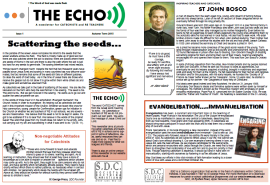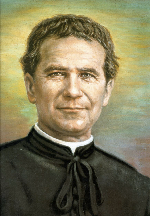More about SDC
PRAY and REFLECT
Other issues
Issue 1: Autumn 2015
Download the pdf version of this issue by clicking here.
The word ‘CATECHIST’ comes from the Greek word meaning ‘to echo’. As Catechists or teachers of RE we do not proclaim our own word. We echo the message of Jesus Christ our Lord. This newsletter aims at providing parish catechists and teachers of RE in schools some support in terms of reflections, ideas, useful resources they can use and so on. Feel free to share with other colleagues and friends. There is also a pdf version which you can download by clicking on the thumbnail below.

| In this issue |
| Scattering the seeds ... |
| Non-negotiable Attitudes for Catechists |
| Inspiring Teachers and Catechists - St John Bosco |
| Evangelisation ... Immanuelisation |
Scattering the seeds ...

In the parable of the sower Jesus compares his Word to the seeds that the sower scatters across his field. The field is mostly made up of good soil but there are also patches where the soil is shallow; there are places where there are seeds of thorns in the soil and there is also the path where the soil is just too hard for any seeds to germinate. The sowing therefore had mixed results.
Things haven't changed much! Despite the fact that two thousand years have passed since Jesus lived and sowing in many countries has now become automated, the fact remains that some of the seed still falls on different patches. So does the word of God today. As in the time of Jesus there are those who receive the gospel but do not allow it to grow within them while others do and make good and sometimes abundant fruit. As catechists we take part in the task of scattering of the seed. We are like the labourers on the farm who help the lead farmer in his sowing. The seed is his. The word is his. But we get involved in the sowing. He wants us to go out and scatter the seed anywhere we can.
In the words of Pope Paul VI in his exhortation ‘Evangelii Nuntiandi’, the Church ‘exists in order to evangelize’. By helping out as catechists we take part in this important mission of the Church. Whether we teach little ones for Holy communion, young people for Confirmation, grown ups for initiation in the Church or whether we are teachers of RE in our schools, we are sowers - we are missionaries. We believe that this seed is not to be kept in sacks. It’s got to be scattered if it is to bear fruit. We believe in the words of the prophet Isaiah “the word that goes from my mouth does not return to me empty, without carrying out my will and succeeding in what it was sent to do.” (Is 55: 11).
Non-negotiable attitudes for Catechists

“Those who come forward to teach and educate children should first see that they possess what they intend to pass on to others: learning and spirit. As to learning or instruction, they should see that at least they have a store of knowledge as to be able to explain or answer the questions which children may come up with. As to the spirit, they ought to be calm persons who do not rush, and have gentility which remarkably attracts people. They need to have charity without which there is neither patience, so necessary when in contact with children, nor generosity which steals the hearts with the smallest gift. Above all, they should be humble for without humility they cannot lower themselves to children’s level.”
St George Preca, SDC Founder
Inspiring Teachers and Catechists - ST JOHN BOSCO

A man of dreams from the start! Aged nine, young John dreamt of turning furious animals into sheep/lambs. Later on he left an account of these allegories which he eventually fulfilled through his long priestly life.
Giovanni Bosco was born 200 years ago on 16 August 1815 in a poor farming family in north Italy, near Turin. His father Francesco died when John was just two years old and the family of four was then ably managed by his mother Margherita. Even before his teens he felt an eagerness to teach others especially the young ones attracting them by the acrobatic skills he had learned in local festas. He also had to seek work. His elder brother Antonio made life difficult for him when John started studying. Their mother had to send John away to continue his studies with the old and holy priest Joseph Cafasso. In 1835 John entered the seminary at Chieti and became a priest in 1841.
As a priest he became more conscious of the great social needs of the young. Turin grew through industrialisation and so did poverty and unemployment. Boys as young as 12 found themselves in prison often due to thieving. Don Giovanni thought of creating something original for them and bring them out of their misery. Mamma Margherita encouraged him and opened their house for them. This was how Don Bosco’s Oratory began!
In spite of strong opposition from the elites, like-minded priests and lay people teamed up with Don Giovanni. At first he sent out ‘his boys’ to work as apprentices, but eventually he and his helpers acquired a building, brought in machinary and organised work and study for them at the Oratory. He felt responsible for their human and religious formation and for this purpose, with his early helpers, he founded the ‘Society of St Francis de Sales’ better known as the ‘Salesians’. Some 12 years later, he started a similar set up for women - the ‘Daughters of Mary help of Christians’.
His ideals were great indeed and they flourished. He died on 31 January 1888. Fortunately Don Bosco’s ideals and formative systems were written down by himself or colleagues. His method is known as the ‘Preventive System with emphasis on good empathic relationships. Pope Pius XI canonized him on Easter Sunday 1934. He was called the ‘Father and Teacher of Youth’. His feastday is celebrated on the 31 January.
Evangelisation ... Immanuelisation

Evangelisation has been a constant and important topic in the teaching of recent popes. Pope Francis in his exhortation The Joy of the Gospel re-emphasised God’s love as manifested in Jesus as very central to catechesis, describing this truth as most beautiful, most grand and most appealing (#35). In catechesis we should bring each participant in touch with this truth and to lead them into a relationship of love with Jesus.
Frank Mercadante, in his book Engaging a New Generation, instead of the word evangelisation uses the word immanuelisation from Immanuel - God is with us (Mt. 1:23). The people who followed Jesus in his earthly life were literally in the presence of God. As catechists we are called to reflect Jesus in our life. We cannot talk about God’s love without showing it. Our own example of serving others in love, as Jesus did, sets the best witness. As we prepare candidates for the sacraments, which are personal encounters with Jesus through the Church, we need first to lead them to strengthen their relationship of love with him and to give him priority in their lives. Though teaching catechism is essential, it should go hand in hand with immanuelisation, starting with ourselves by fostering in us the attitudes of Jesus.
May God bless our efforts in this vital ministry of faith formation leading to a closer union of love with Jesus and a committed Christian life.
Download the pdf version of this issue by clicking here.

Follow us on